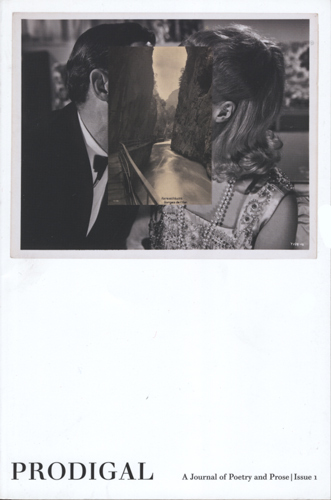Prodigal – Fall 2015
Before even opening the first issue of Prodigal, its matte cover felt comfortable in my hands, inviting, like a good handshake at the front door of an unfamiliar residence. Inside, the journal is rich with traditional and experimental poetry that plays with form, structure, and even grammatical conventions. There are poems broken into parts, prose poems, and poems that demand attention in different spaces across the page. The issue also includes a few prose pieces, an interview with political theorist Wendy Brown, and translated works from Søren Kierkegaard, Juan Benet, and Bertolt Brecht. Before even opening the first issue of Prodigal, its matte cover felt comfortable in my hands, inviting, like a good handshake at the front door of an unfamiliar residence. Inside, the journal is rich with traditional and experimental poetry that plays with form, structure, and even grammatical conventions. There are poems broken into parts, prose poems, and poems that demand attention in different spaces across the page. The issue also includes a few prose pieces, an interview with political theorist Wendy Brown, and translated works from Søren Kierkegaard, Juan Benet, and Bertolt Brecht.
Eli Payne Mandel’s excerpt from “Stations of the Cross” reads as a prose poem in the absurdist vein of Russell Edson. The poem begins with a woman crying out, “O lord, I am in despair, she said, in that funny way of hers that meant, O lord, recognize me not.” The action moves quickly forward as the woman consults her wife, who is a fig tree, her psychiatrist, who does not exist, and her parents, who are sunk in the ground. Though the world Mandel constructs is absurd, he draws upon existential concerns that bring the story close to reality. The last line of the piece is most haunting: “Where does it go, she asked the conductors, who consulted one another and said at last, This is not your train, take the next. . . .”
In his essay “Some Books Are to Be Dropped into Wells, Others into Fish Ponds,” Gerald Murnane explores the experiences of reading and remembering (or not remembering at all) what he has read. His endeavor is best summed up when he says, “I became interested in the question why I remembered certain books and forgot others” and “Some books that I have not read for more than thirty years have left me with images that I see nearly every day.” Throughout the essay, Murnane describes his recollections of various books. For example, he cannot remember a single thing about Don Quixote, and he misremembers parts of Moby Dick. Interestingly, an image from a book he read when he was eight years old stays with him to this day: a red cow dying of thirst. At the end of the essay, he rescues this image and combines it with memories from other texts: “The red cow smells the water. She goes down from the meadows of hay towards the pool that keeps her alive.”
“The West” by Carina del Valle Schorske plays with the traditions of pastoral poetry, recounting memories rich with movement and color. The speaker describes the unfruitful vineyard behind the complex where she lived with her mother:
On bright days
the tinsel tied to the vines
glittered like fish frantic
on the hook of the wind—
Throughout the piece the speaker clearly yearns for a change in her situation, a sorrow because she cannot play with the other children. In the conclusion of the poem, the speaker reveals her desire and offers a melancholic image that stayed with me long after I finished:
I looked out the kitchen window
through the steam let off
by the laundry room, and tried to hear—
could almost hear—the sounds
of spirits gathering the bitter
green knots of unborn grapes.
Prodigal is filled with work from seasoned writers and sings with possibilities for future contributors. So many of these pieces have stayed with me, their images and ideas that feel as familiar and distant as recalling dreams. I look forward to reading future issues and anticipate being surprised and struck by the potentials of form I have never before seen in print.
[www.prodigallitmag.com]





